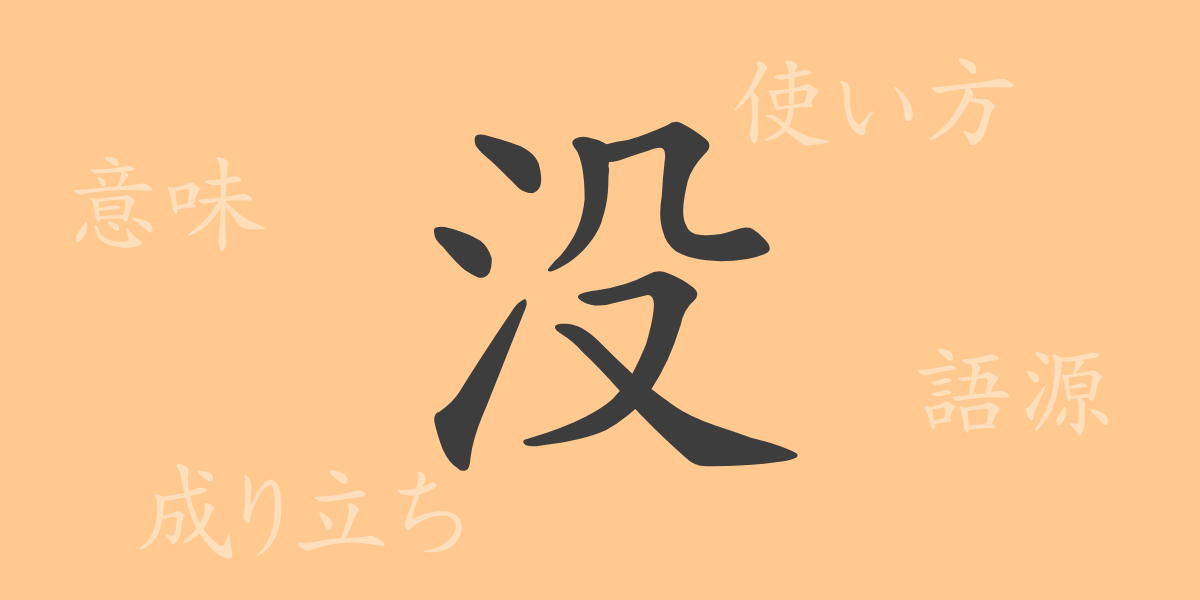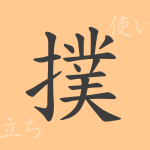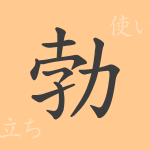Kanji (かんじ) are elements of the Japanese language that possess diverse meanings through their shapes and combinations. One of the common kanji used in Japan is “没” (ぼつ, botsu). This kanji is significant and frequently used in daily life and business scenes, but what kind of history and meaning does it hold? In this article, we will provide a detailed explanation of “没” (ぼつ, botsu) from its origins, meanings, usages, readings, and related idioms and phrases.
The Origins of 没 (ぼつ, botsu)
The kanji “没” (ぼつ, botsu) developed from ancient Chinese pictographs that depicted water sinking into the ground and becoming invisible. Originally, it represented the state of submersion in water, and over time, it came to include meanings such as disappearance, failure, and death. The shape of this character consists of the radical “氵” (さんずい, sanzui), which is related to water, and “殳” (ほこづくり, hokozukuri), which originally meant a weapon or tool. It is believed to express the idea of something related to water disappearing.
The Meaning and Usage of 没 (ぼつ, botsu)
“没” (ぼつ, botsu) primarily means “to sink,” “to disappear,” or “to die.” In usage, it often refers to the disappearance of things or the death of people. Additionally, when combined with adjectives or other kanji, it can form various idiomatic expressions. Words like “没落” (ぼつらく, botsuraku) and “没頭” (ぼっとう, bottou) convey meanings of “decline and disappearance” and “being deeply engrossed,” respectively.
Readings, Stroke Count, and Radical of 没 (ぼつ, botsu)
The basic information about the kanji “没” (ぼつ, botsu) is as follows:
- Readings: The on’yomi (音読み) is “ボツ” (ぼつ, botsu), and the kun’yomi (訓読み) is “しずむ” (しずむ, shizumu) and “しずめる” (しずめる, shizumeru).
- Stroke Count: It has a total of 7 strokes.
- Radical: The radical is “氵” (さんずい, sanzui).
Idioms, Phrases, and Proverbs Using 没 (ぼつ, botsu) and Their Meanings
There are various idioms, phrases, and proverbs that include “没” (ぼつ, botsu). Some examples are:
- 没落 (ぼつらく, botsuraku): The decline and disappearance of something that once prospered.
- 没頭 (ぼっとう, bottou): Being deeply engrossed in something.
- 没収 (ぼっしゅう, bosshū): The act of confiscation by those in power.
- 没入 (ぼつにゅう, botsunyū): To sink into water; by extension, to deeply immerse oneself in an environment or situation.
- 水没 (すいぼつ, suibotsu): To sink into water and become invisible.
Summary of 没 (ぼつ, botsu)
The kanji “没” (ぼつ, botsu) expresses concepts of disappearance, loss, and death while being related to water. In Japanese, there are numerous idiomatic expressions and phrases that use this kanji, each carrying unique nuances. When using “没” (ぼつ, botsu) in writing, it is essential to understand its deep history and diverse meanings to use it appropriately. As one of the common kanji in Japanese, “没” (ぼつ, botsu) will continue to play an important role in our language.

























